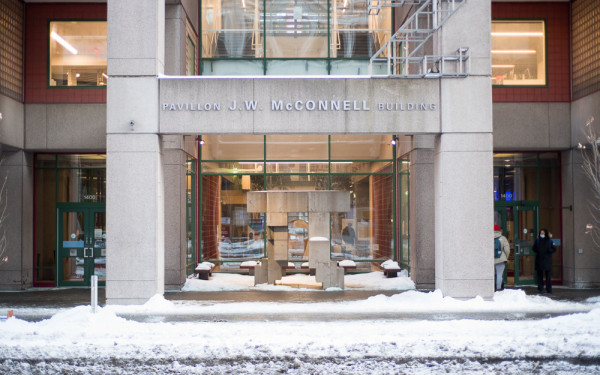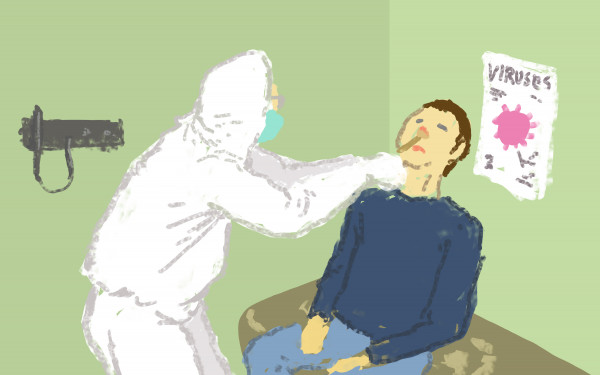Minimal COVID-19 protocols on campus: reasonable or “blatant disregard?”
Experts warn a lack of COVID-19 protocols could lead to more cases as the semester begins. Graphic Nadine Abdel Latif
Many post-secondary institutions have removed mask mandates, but experts warn their absence could worsen outbreaks on campuses
In early July, Concordia student S, who wished to stay anonymous, contracted COVID-19.
Not wanting to transmit the virus to her summer school classmates, she immediately contacted her French Studies professor, Radostin Tonev, to let him know of her absence.
Tonev replied to S on July 4, telling her that because she didn’t have any medical proof of her illness, she would have little choice but to take her midterm in person.
In an email written five minutes before S was supposed to take her exam, Tonev claimed he wasn’t aware Concordia advised community members who tested positive to self-isolate. He told her she could take the exam once she tested negative.
Shoshanah Jacobs, an associate professor in the department of integrative biology at the University of Guelph, said that universities “need to act like adults” in managing the pandemic.
“It sounds like Concordia and Guelph are pretty much on the same track of complete and blatant disregard for the safety and health of their community,” said Jacobs. They added that leaving COVID accommodations to the discretion of professors under the pretense of respecting academic freedom is a poor excuse “because what they can do is protect the health and safety of the campus.”
Since the mask mandate at Concordia was removed in late June, the community has been divided on whether or not it should be reinstated. Surveys conducted by The Link on social media show that students are not on the same page regarding the effectiveness of masks.
According to a Reddit poll conducted on July 11, 50 per cent of Concordia students reported they would not feel safer on campus if Concordia re-implemented its mask mandate. Some said they already felt safe without masks, and others argued that “barely anyone wears [masks] properly.”
One student commented, “an auditorium crammed with 80-300 people wearing masks is an absolute farce. No more masks.” Many others complained about being tired of masking entirely.
.png)
In contrast, 36 per cent of students voted that they would feel safer if Concordia reinstated its mask mandate. The remaining voters were unsure of where they stood on the issue.
This demographic of students shared stories of people attending lectures while visibly sick. Several users called this behaviour selfish, reminding people that it’s still possible to die from COVID-19 or to get long COVID.
“I can throw data and science at folks to demonstrate that [masks] work really well, but we also know that science and data don’t really help motivate folks,” said Jacobs. They explained how most people who refuse to wear masks only do so to be oppositional.
“We all deserve to make it [out of the pandemic], and if putting a piece of cloth on your face is going to ensure that, then it’s not a lot to ask,” they added.
Ryan Gregory, a professor of evolutionary biology at the University of Guelph, said that removing mask mandates doesn’t benefit anyone. He is worried there will be a bigger wave in the fall compared to the seventh one as residences, which tend to have poor ventilation, reopen at full capacity.
“We’re looking at a very transmissible variant or at least immune escaping variant that is quite contagious and is likely to spread very quickly if people aren’t taking precautions,” he said.
Concordia Spokesperson Vannina Maestracci confirmed that the shared double rooms in the Hingston Hall residences, which had been split into single rooms during the pandemic, will be available again during the 2022-23 academic year.
“Residence Life works with the Environmental Health and Safety (EHS) unit to determine COVID protocols and use the current guidelines from Public Health,” Maestracci told The Link. “As we did this past year (academic year 2021-22), we will have isolation rooms available on both campuses and will maintain protocols for positive or symptomatic residents which include one-on-one guidance, assistance to get tested, daily check-ins and meal delivery three times a day.”
Universities are in the unique position of having experts in almost every field relevant to pandemic management, Gregory said, yet most seem to be operating based on the decisions of a handful of administrators with no such relevant background.
“By defaulting to the public health regulations, the university is shirking their responsibilities and is minimizing the cost associated with keeping us safe.” — Shoshanah Jacobs
Solely following and relying on the recommendations of public health officials might not be enough to keep students safe, he continued. The professor insisted that universities should be creating panels of experts and listening to them in order to set an example for other institutions to follow.
“There are perfectly safe and healthy ways of socializing,” said Jacobs, “but by defaulting to the public health regulations, the university is shirking their responsibilities and is minimizing the cost associated with keeping us safe.”
They added that the lack of regulations and care for safety is forcing some students to withdraw, making it an equity issue.
“We’re creating a further and deeper gap in our social structure, such that [out of] the young folks who should be going through university right now, some of them will be forced to leave; a lot of them will have long-COVID and other disabilities ” emphasized Jacobs.
Gregory highlighted that damage to major organs, brain inflammation, blood clots, and diabetes may occur as a result of long COVID, and these symptoms can appear either months or years after initial infection.
Universities’ motives for wanting to drop all restrictions appear to be financial, he said, since an important source of revenue for them is having students utilize on-campus services.
Having been a department chair for the first two years of the pandemic, Gregory said that administrations are “failing to recognize reality […] and listening to the wrong people.”
Gregory and Jacobs agreed that across Canada, most universities and colleges were dropping the mask mandate in the fall with the exception of a few, including the University of Manitoba and Seneca College in Ontario.
“It’s one thing to get it wrong twice, but six times in a row is really remarkable.” — Ryan Gregory
“Since the beginning of the pandemic, Seneca made it a priority to put the health and safety of our community first,” said Corey Long, the Executive Director of Communications at Seneca College.
Administrations of universities who have removed mask mandates are quick to defend themselves, as they are simply following public health guidelines. But Jacobs highlighted the importance of remembering that “a campus is not a public health population.”
Rather, Jacobs defines a campus population as being distinct, with predictable behaviours. For example, university students are more likely to gather in large groups and partake in group activities, they specified.
Long agreed that campuses are unique environments, adding that laboratory settings demand students and instructors to share equipment and be in proximity to one another. Such conditions, he said, “require additional health and safety measures to make sure everyone safely reaches the outcomes of their programs and are prepared to start their careers.”
“We’ve said all along that we will look to public health guidelines when it comes to our approach to dealing with COVID, but in some cases, we’ve exceeded them,” Long said.
“We’ve said all along that we will look to public health guidelines when it comes to our approach to dealing with COVID, but in some cases, we’ve exceeded them.” — Corey Long
He specified that Seneca students are now only required to wear a mask in enclosed spaces where physical distancing is impossible, but some students have complained about the mask mandate, especially during hot summer days.
“People don’t like wearing masks,” he said, “but at the same time, [masks] make a big difference from a safety perspective.”
Gregory said he’s alarmed that most universities are still mismanaging the COVID pandemic well into the seventh wave. “It’s one thing to get it wrong twice,” he added in reference to the first two waves, “but six times in a row is really remarkable.”
“There’s a real issue when you [consider] yourself a research-intensive university and you're constantly bragging about the strength of your research, your scientists and your scholars, and you completely ignore them,” he concluded.


_600_375_90_s_c1.jpg)

_600_375_90_s_c1.jpg)